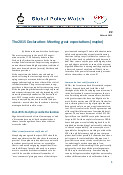Published on Thu, 2015-07-23 19:13
The third Financing for Development (FfD) conference in Addis Ababa concluded last Thursday, July 16, in bad faith as developed countries rejected a proposal for a global tax body and dismissed developing countries’ compromise proposal to strengthen the existing U.N. committee of tax experts. Usually, when large conferences end after conflicts and climax in intergovernmental negotiations, there is a sense of exhilaration. This did not happen in Addis Ababa. |
In an inter-connected world, a US human rights-centered macroeconomic and financial policy is needed
People around the world were impacted by the 2008 financial crisis which stemmed from the US´s financial policies. The key human rights lesson from the crisis is that the economic and social rights of people and nations everywhere are interconnected. In our inter-connected world, the US must make economic decisions that respect the human rights of all individuals who will be impacted by national, economic, financial and fiscal policy. At one level, economic policy in the United States should be guided by the principle of progressive realization and non-retrogression. Progressive realization recognizes that the resources at the disposition of a government are limited; nevertheless, a government must take specific steps to ensure that the enjoyment of economic and social rights improves over time. Non-retrogression means that once a particular level of enjoyment of rights has been realized, it should be maintained. |
Published on Thu, 2015-07-16 00:00
People around the world were impacted by the 2008 financial crisis which stemmed from the US´s financial policies. The key human rights lesson from the crisis is that the economic and social rights of people and nations everywhere are interconnected. In our inter-connected world, the US must make economic decisions that respect the human rights of all individuals who will be impacted by national, economic, financial and fiscal policy. At one level, economic policy in the United States should be guided by the principle of progressive realization and non-retrogression. |
Published on Tue, 2015-07-14 14:16
Manila, Philippines–Today, we witness state leaders, high-level officials, civil society groups, and business representatives convene for the Third International Conference on Financing for Development (FfD3) in Addis Ababa, Ethiopia to discuss and agree on an action plan for financing development, including the Sustainable Development Goals to be adopted by UN member states in the September 2015 Summit. “We started from an optimistic viewpoint on FfD3 and now ending with so much disappointment over what seems like retrogression from old agreements. There is no mention at all of peace dividends generated from the elimination of weapons of mass destruction and nuclear weapons, and the reduction in defense spending. Debt relief and condonation are treated marginally. The emerging document suggests business as usual. It doesn’t explain the fundamental reasons for why there is lack of financing sustainable development,” lamented Isagani Serrano, co-convener of Social Watch Philippines (SWP) and president of the Philippine Rural Reconstruction Movement (PRRM). |
Published on Wed, 2015-07-08 11:07
With pens still hovering over the Addis Ababa Action Plan, the outcome agreement for the Third International Conference on Financing for Development (FfD3), there is already a sense that for all the recent talk at the UN about ambition and transformation, it is falling short. For a financing document, the Action Plan includes an impressive number of references to issues at the core of sustainable and inclusive development, like social protection, essential services, decent work for all and sustainable industrialization. There are multiple references to consumption and production, a rebalancing of which, among the rich and the poor, will determine the future of our world. |
SUSCRIBE TO OUR NEWSLETTER






